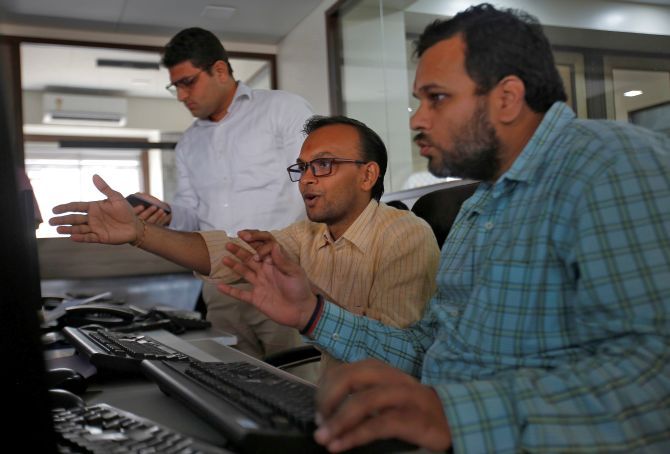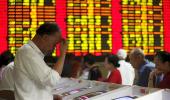Experts say foreign investor sentiment was bolstered by the US Federal Reserve's decision to go slow with interest rate hikes and hopes of political stability.
Sundar Sethuraman and Samie Modak report.

Overseas investors have poured $3.2 billion (Rs 22,340 crore) into domestic equities till the middle of this month.
If the rest of the month sees no outflows, this will be the highest inflow tally in a calendar month since March 2017, when foreign portfolio investors (FPIs) had pumped in $5.1 billion.
Experts say foreign investor sentiment was bolstered by the US Federal Reserve's decision to go slow with interest rate hikes and hopes of political stability.
Most opinion polls have suggested the ruling National Democratic Alliance (NDA) will come back to power in the upcoming general elections, which begins next month.
The US Fed's dovish stance has led to the cooling off in US bond yields, spurring risk-on sentiment globally.
The yield on the 10-year US Treasury is currently trading below 2.6 per cent. Before the US Fed's January-end meeting, it traded above 2.75 per cent.
The MSCI World Index, a gauge of global equity performance, has rallied 6 per cent since the US central bank's decision to press pause on rate hikes.
"Rising prices of both debt and equity are emblematic of loose global liquidity conditions, consistent with the markets pricing in a larger Fed balance sheet," says Hans Redeker, global head of FX strategy at Morgan Stanley, adding the markets are pricing for "ample liquidity" conditions.
The performance of equity markets is highly co-related to the US bond yield.
In October 2018, most global markets, including India, were on the verge of slipping into bear market territory after the 10-year US bond yield had shot up to above 3.2 per cent.
Analysts say the current Treasury levels are supportive of risk sentiment.
HSBC is forecasting the US yields to remain at current levels till this year, a positive signal for the equity market.
"Our economists expect just one rate hike in 2019, most likely in September, with the Fed moving into rate-cutting mode in 2020 as the US economy slows," says HSBC in a note this month.
The brokerage says based on last year's FPI flows, India is among the most under-owned market in Asia.
There are many triggers for overseas investors to "rotate" into Indian equities, it says.

Till mid-February, India was the worst-performing major global market in 2019.
While most regional peers saw an upmove amid FPI interest, India lagged behind due to domestic issues such as political uncertainty, flare-up in cross-border tensions, tepid earnings growth, and aftermath of the non-banking financial company liquidity crisis.
After concerns eased on most of these fronts, FPIs have piled on to domestic equities.
"The fears that kept India out of global markets rally have reduced.
"Domestic equities are finally participating in the rally," says Saurabh Mukherjea, founder, Marcellus Investment Managers.
U R Bhat, managing director, Dalton Capital Advisors, adds, "There was some uncertainty around the elections that was keeping the FPIs away.
"The opinion polls that came during the weekend suggest the NDA is coming back.
"There is some revival of the economy, and earnings growth is on the cards."
From their 2019 lows on February 19, the benchmark indices have rallied around 8 per cent, following the robust buying by FPIs.
In the past one month, FPIs have bought domestic shares worth $6 billion.
About a third of this, however, has been on account of large block deals and share sales in listed companies.










